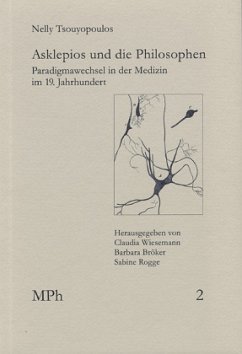In the 19th century, a Copernican turn took place in medicine with the development of the cell theory. We take it completely for granted today that the human body is made up of cells which determine its structure and its function. But this doctrine has only been defining medical thinking for 150 years and it replaced theories which had been valid for an inconceivable 2000 years. The author interprets this transition as a paradigm shift, and she explores it in the works of German, English and French doctors in the 18th and 19th century. She sheds light on the influence of philosophy, in particular the impact of Kan's and Schelling's ideas. This study of the philosophical foundations of modern medicine is addressed to philosophers, science historians and medical physicians.
»With her final work Tsouyopoulos has given us an impressive history of ideas, a synthesis of history of medicine and philosophy that has become all too rare nowadays. [...] she has bequeathed a powerful narrative and historical interpretation that deserves attention beyond a German readership. It should inspire today's historians of medicine to exploit fully the potential of intellectual history and to pay close attention to the philosophical underpinnings of medical change.« Andreas-Holger Maehle, Medical History

